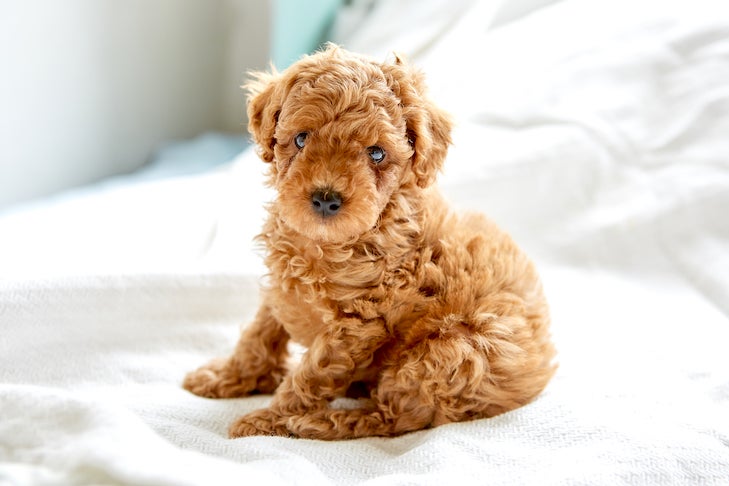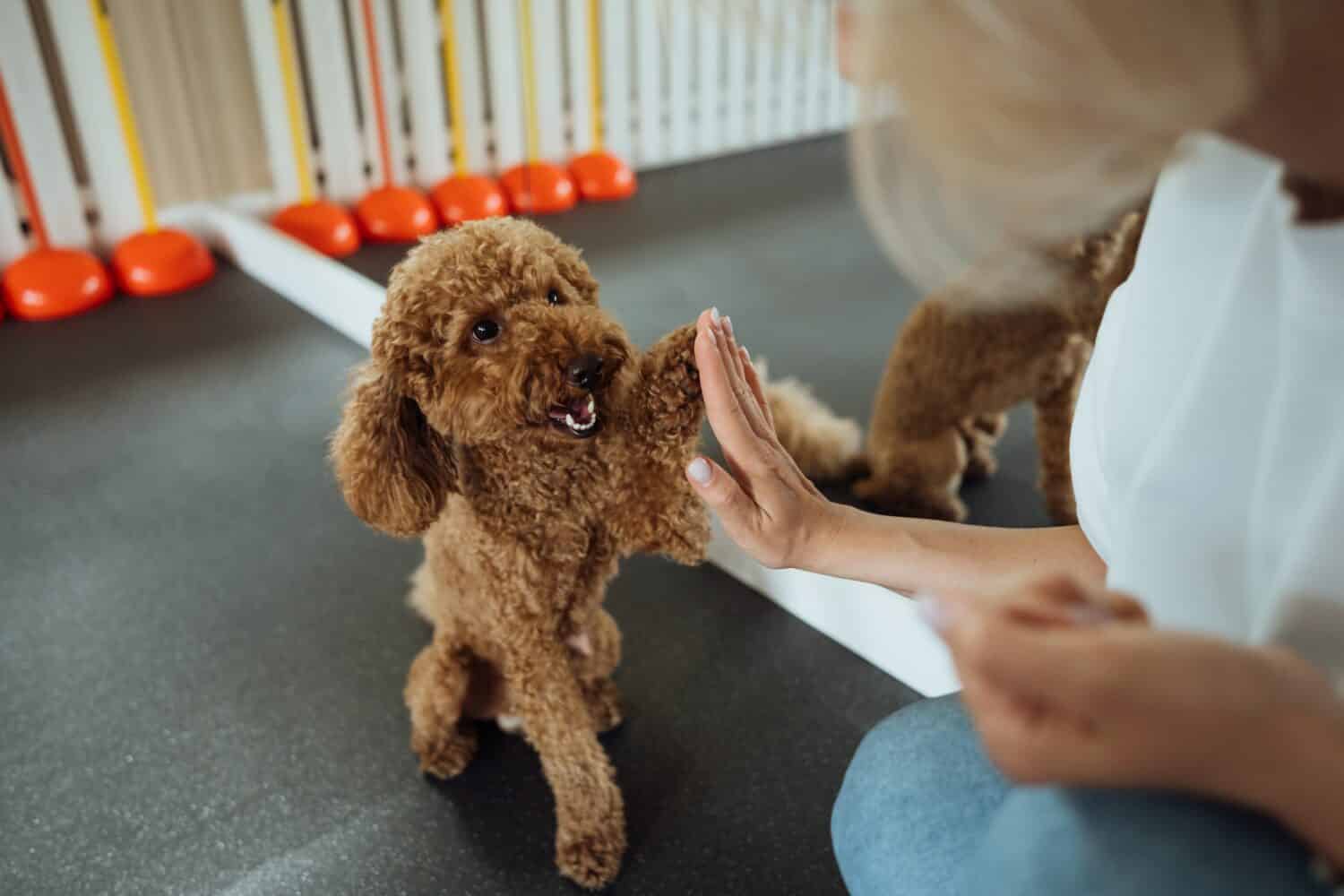When does a toy poodle stop being a puppy? It’s a question that many dog owners ponder. These adorable little dogs are known for their playful nature and lovable personalities, but just like all puppies, they eventually grow up. So, at what point do they transition from puppyhood to adulthood?
The answer lies in their physical and mental development. While there is no exact age at which a toy poodle stops being a puppy, most experts agree that they reach full maturity around one year of age. At this point, they have usually stopped growing, both in height and weight, and their behavior has become more settled. However, it’s important to remember that individual dogs may mature at slightly different rates, so it’s important to monitor your toy poodle’s progress and consult with your veterinarian for guidance.
A toy poodle generally stops being a puppy around the age of 1 year. This is when they reach physical maturity and their growth plates close. However, it’s essential to note that the transition from puppyhood to adulthood can vary slightly from dog to dog. Some toy poodles may still exhibit puppy-like behavior until they are around 18-24 months old. Proper nutrition, exercise, and socialization during this time will help them mature into well-rounded adult dogs.

The Transition from Puppyhood to Adulthood in Toy Poodles
Toy poodles are adorable and playful creatures that bring joy and happiness to their owners. However, every puppy eventually grows up and becomes an adult, undergoing various physical and behavioral changes along the way. In this article, we will explore the journey of a toy poodle from puppyhood to adulthood and discuss when exactly a toy poodle stops being a puppy.
Toy poodles, like other dog breeds, go through different stages of development as they age. Understanding these stages and the signs of maturity can help toy poodle owners provide the appropriate care and training for their furry friends.
Stage 1: The Puppy Phase
When you bring home a toy poodle puppy, you are welcoming a bundle of energy and curiosity into your life. Toy poodle puppies typically stay with their mother and littermates until they are around 8 to 10 weeks old before going to their new homes.
During the puppy phase, toy poodles are small, playful, and highly trainable. They rely on their mother and human caregivers for nourishment, warmth, and socialization. This is an essential period for their physical and mental development.
Toy poodle puppies start to explore their surroundings, learn basic commands, and develop their personalities. They are full of energy and require plenty of playtime, positive reinforcement training, and socialization to ensure they grow up to be well-rounded adult dogs.
Stage 2: Adolescence
As toy poodle puppies grow older, they enter the adolescent stage. This stage usually begins around 6 to 9 months of age and can last until they are around 2 years old. Adolescence is a time of significant physical and behavioral changes.
During adolescence, toy poodles experience a growth spurt, their adult coat starts to come in, and they may become sexually mature. This is also the stage where certain behavioral issues, such as rebelliousness or testing boundaries, may arise.
It is crucial for toy poodle owners to continue with consistent training and socialization during this period to ensure their furry companions develop into well-behaved, obedient adult dogs. Patience and positive reinforcement are key in navigating the challenges of adolescence.
Stage 3: Adulthood
Once toy poodles reach around 2 years old, they are generally considered adults. At this stage, they have fully matured physically and mentally. Toy poodles are known for their longevity and can live to be 15 years or older, so adulthood is a significant phase of their lives.
Adult toy poodles have a more settled disposition and are typically less hyperactive than when they were puppies or adolescents. They have established their personalities and may display more consistent behaviors. However, it is important to note that individual toy poodles may still retain their playful and mischievous nature.
During adulthood, toy poodles require regular exercise, a balanced diet, and continued mental stimulation to ensure they stay healthy and happy. Regular veterinary check-ups and preventative care are also essential to catch any health issues early.
Signs That a Toy Poodle Has Transitioned from Puppyhood
While there is no exact age at which a toy poodle stops being a puppy, there are certain signs that indicate the transition from puppyhood to adulthood. It’s important to remember that every toy poodle is unique, and individual development can vary. Here are some signs that your toy poodle has transitioned from puppyhood to adulthood:
1. Physical Maturity
One of the primary signs of a toy poodle transitioning into adulthood is physical maturity. They will have reached their full height and weight, typically around 10 inches in height and weighing between 4 and 6 pounds. Their adult coat will have come in, and any baby teeth will have been replaced by permanent teeth.
2. Stable Personality
Adult toy poodles have a more settled personality compared to their puppy selves. They have established their likes, dislikes, and general temperament. While some playful and mischievous behaviors may still persist, they are generally more consistent in their behaviors.
3. Training Progress
Adult toy poodles will have made progress in their training journey. They will have mastered basic commands such as sit, stay, and come, and may have even undergone advanced training. Their ability to understand and follow instructions will be significantly improved compared to their puppy days.
4. Decreased Hyperactivity
While toy poodles are known for their energy and playfulness, adult toy poodles tend to have decreased hyperactivity compared to their puppy and adolescent stages. They may still enjoy playtime and exercise, but they are generally more settled and content to relax with their owners.
Conclusion
The transition from puppyhood to adulthood in toy poodles is a gradual process that involves physical and behavioral changes. While there is no specific age for when a toy poodle stops being a puppy, key signs such as physical maturity, a stable personality, training progress, and decreased hyperactivity indicate the transition.
Key Takeaways: When Does a Toy Poodle Stop Being a Puppy?
1. Toy poodles typically stop being puppies between 9 and 12 months of age.
2. At this age, they reach their full adult size and weight.
3. Training should be completed during the puppy stage to set good behavior habits.
4. It is important to start socializing the toy poodle as early as possible.
5. Regular veterinary care and proper nutrition are essential for the toy poodle’s health as it transitions into adulthood.
Frequently Asked Questions
In this section, we will answer some common questions about when a toy poodle stops being a puppy. Read on to find out more!
1. At what age does a toy poodle no longer be considered a puppy?
A toy poodle is generally considered a puppy until it reaches the age of one year old. During this time, the toy poodle is in its developmental stages and is still growing and learning. After the age of one, the toy poodle is considered an adult dog.
However, it’s important to note that the transition from puppyhood to adulthood can be gradual and may vary for each individual toy poodle. Some toy poodles may show signs of maturity earlier, while others may take longer to reach full adulthood.
2. What are the signs that a toy poodle is transitioning from puppyhood to adulthood?
As a toy poodle grows and matures, there are several signs that indicate the transition from puppyhood to adulthood. One of the main signs is a decrease in playful behavior. Adult toy poodles tend to be calmer and less prone to engaging in puppy-like antics.
Additionally, adult toy poodles may have a more settled temperament and show increased independence. They may also have completed their growth spurt and reached their full size and weight.
3. When should I start training my toy poodle as an adult dog?
Training should ideally begin during the puppy stage, but it’s never too late to start training a toy poodle as an adult dog. The key is to be consistent and patient in your training efforts.
Adult toy poodles can still learn new commands and behaviors, but it may take slightly more time and effort compared to training a puppy. Consider enrolling your toy poodle in a basic obedience class or working with a professional dog trainer to help you navigate the training process.
4. Are there any health considerations for adult toy poodles?
As toy poodles transition from puppyhood to adulthood, it’s important to pay attention to their health needs. Regular veterinary check-ups are crucial to monitor their overall health and detect any potential issues early on.
In addition to routine vaccinations and preventive care, adult toy poodles may require dental cleanings, grooming, and a balanced diet to maintain their health. Regular exercise and mental stimulation are also essential to keep them physically and mentally fit.
5. Can adult toy poodles still bond with their owners like they did as puppies?
Absolutely! Toy poodles are known for forming strong bonds with their owners, and this bond can continue to strengthen as they transition into adulthood. Adult toy poodles are often loyal, affectionate, and love spending time with their human companions.
It’s important to continue providing love, attention, and positive reinforcement to your adult toy poodle to maintain a strong and trusting relationship. Regular playtime, training sessions, and quality time together will help reinforce the bond between you and your toy poodle.

5 Things You Must NOT Do To Your Toy Poodle / All Toy Poodle Owners Must Watch!
When does a toy poodle stop being a puppy? Toy poodles typically stop being puppies between 1 and 2 years of age.
During this time, they go through various stages of development and maturation. Once they reach this age, they are considered adults and are fully grown in size and behavior.
